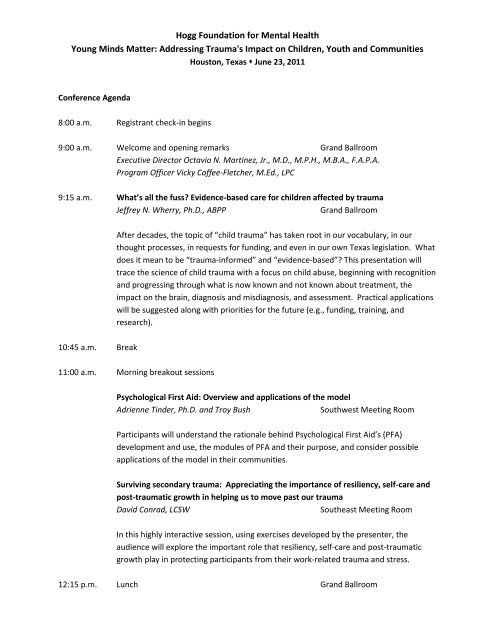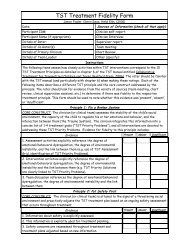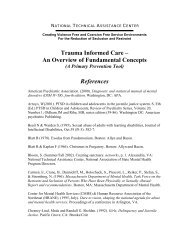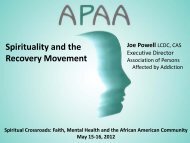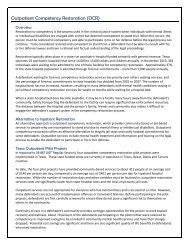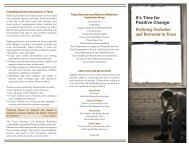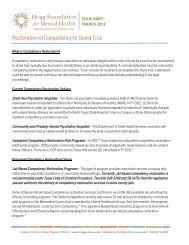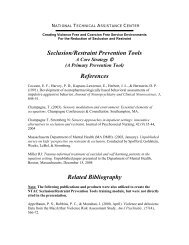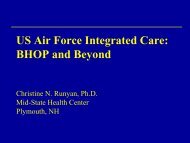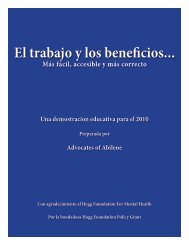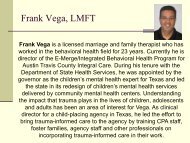Agenda - Hogg Foundation for Mental Health
Agenda - Hogg Foundation for Mental Health
Agenda - Hogg Foundation for Mental Health
Create successful ePaper yourself
Turn your PDF publications into a flip-book with our unique Google optimized e-Paper software.
<strong>Hogg</strong> <strong>Foundation</strong> <strong>for</strong> <strong>Mental</strong> <strong>Health</strong><br />
Young Minds Matter: Addressing Trauma's Impact on Children, Youth and Communities<br />
Houston, Texas June 23, 2011<br />
Conference <strong>Agenda</strong><br />
8:00 a.m. Registrant check-in begins<br />
9:00 a.m. Welcome and opening remarks Grand Ballroom<br />
Executive Director Octavio N. Martinez, Jr., M.D., M.P.H., M.B.A., F.A.P.A.<br />
Program Officer Vicky Coffee-Fletcher, M.Ed., LPC<br />
9:15 a.m. What’s all the fuss? Evidence-based care <strong>for</strong> children affected by trauma<br />
Jeffrey N. Wherry, Ph.D., ABPP<br />
Grand Ballroom<br />
After decades, the topic of “child trauma” has taken root in our vocabulary, in our<br />
thought processes, in requests <strong>for</strong> funding, and even in our own Texas legislation. What<br />
does it mean to be “trauma-in<strong>for</strong>med” and “evidence-based”? This presentation will<br />
trace the science of child trauma with a focus on child abuse, beginning with recognition<br />
and progressing through what is now known and not known about treatment, the<br />
impact on the brain, diagnosis and misdiagnosis, and assessment. Practical applications<br />
will be suggested along with priorities <strong>for</strong> the future (e.g., funding, training, and<br />
research).<br />
10:45 a.m. Break<br />
11:00 a.m. Morning breakout sessions<br />
Psychological First Aid: Overview and applications of the model<br />
Adrienne Tinder, Ph.D. and Troy Bush<br />
Southwest Meeting Room<br />
Participants will understand the rationale behind Psychological First Aid’s (PFA)<br />
development and use, the modules of PFA and their purpose, and consider possible<br />
applications of the model in their communities.<br />
Surviving secondary trauma: Appreciating the importance of resiliency, self-care and<br />
post-traumatic growth in helping us to move past our trauma<br />
David Conrad, LCSW<br />
Southeast Meeting Room<br />
In this highly interactive session, using exercises developed by the presenter, the<br />
audience will explore the important role that resiliency, self-care and post-traumatic<br />
growth play in protecting participants from their work-related trauma and stress.<br />
12:15 p.m. Lunch Grand Ballroom
<strong>Hogg</strong> <strong>Foundation</strong> <strong>for</strong> <strong>Mental</strong> <strong>Health</strong><br />
Young Minds Matter: Addressing Trauma's Impact on Children, Youth and Communities<br />
Houston, Texas June 23, 2011<br />
1:15 p.m. Afternoon breakout sessions<br />
Children affected by trauma: What works – and what doesn’t<br />
Frank Vega, LMFT<br />
Southwest Meeting Room<br />
Understanding the impact that trauma plays in the lives of children and adolescents is<br />
key if we are to provide them with the services they need to move past survival mode.<br />
During this session attendees will learn about the different types of trauma a child may<br />
experience, the impact on the child’s development, a tool <strong>for</strong> assessing the trauma, and<br />
effective treatment approaches.<br />
Through the looking glass: Understanding trauma through a cultural competence lens<br />
Larry D. Brown, Jr., MPA and Regenia A. Hicks, Ph.D. Southeast Meeting Room<br />
This workshop will address the impact culture has on the expression and response of<br />
children, youth and families who have experienced traumatic events. In<strong>for</strong>mation will<br />
be shared on working with immigrant/refugee populations and the impact of<br />
community violence on children, youth, families, and special populations, such as youth<br />
who are lesbian, gay, bisexual, transgender or questioning (LGBTQ). Presenters will<br />
discuss strategies <strong>for</strong> enhancing resilience within children and youth and will highlight<br />
specific ideas on the role of the community in responding to traumatic occurrences.<br />
2:30 p.m. Break<br />
2:45 p.m. Closing plenary session Grand Ballroom<br />
Secondary Trauma: Understanding its impact and taking steps to protect yourself<br />
David Conrad, LCSW<br />
The presenter will define secondary trauma and describe how it is similar to and<br />
different from burnout, vicarious trauma, compassion fatigue and post-traumatic stress<br />
disorder. He also will identify potential risk factors and indicators of distress <strong>for</strong><br />
professionals working with traumatized and distressed children and families. Personal,<br />
organizational and professional strategies that participants can use to protect<br />
themselves also will be provided.<br />
4:00 p.m. Closing remarks Grand Ballroom


